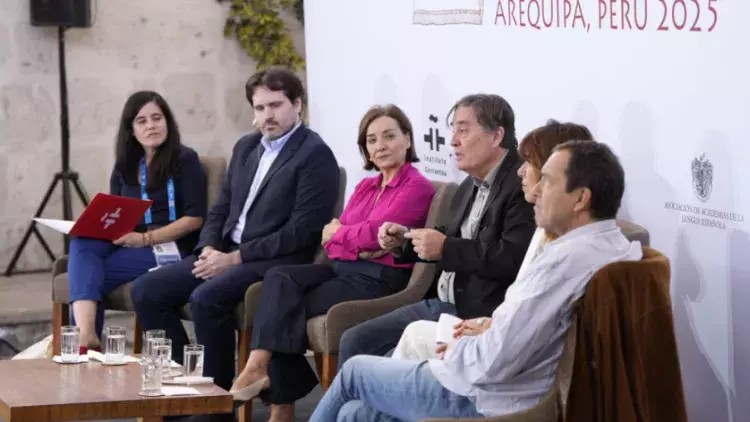The Diplomat
The 10th International Congress of the Spanish Language (CILE) in Arequipa kicked off this Monday, October 13, with the roundtable “Fake News. The Power of Lies.” Participants warned about the proliferation of fake news, the spread of which is equivalent to “facing a pandemic.”
The Cervantes Institute, in collaboration with the Ministry of Foreign Affairs, organized this discussion at the Mario Vargas Llosa Regional Library. Participants included the director of the Cervantes Institute, Luis García Montero; journalist Pepa Bueno; journalist and CEO of Prodigios Volcán, María Moya; and journalist Juan Aurelio Arévalo Miró-Quesada. The panel was moderated by literary critic Jordi Gracia and the director of Culture at the Cervantes Institute, Raquel Caleya.
The director of the Cervantes Institute focused on a new way of communicating, in which technology “can turn anything into news because you see it with your own eyes.” “This substitution of reality for virtual reality affects something fundamental in journalism, because reporting is not the same as communicating,” warned García Montero, for whom “we must flee from dogmas and continue to seek reasons to defend our own values.”
In this sense, he also warned about hoaxes, citing a report from the United States that found that of the nearly 10,000 advertisements by US President Donald Trump, 76% were false. “There are many hoaxes, and they all multiply due to a new way of communicating, but we must also consider that they invite us to establish a relationship and a way of thinking about the truth,” he warned.
For her part, RTVE journalist Pepa Bueno recalled that lies “have always existed,” only now the novelty is “the ability to be shared globally.” “The consensus on reality has been broken, and there is also a breakdown in the shared world, which endangers both democracy and journalism,” she stated.
Literary critic Jordi Gracia highlighted the “breakneck speed” of change that is achieving “the spread of lies and the entrenchment of lies without shame.” “My impression is that there is a planned, very conscious, militant campaign to undermine the survival of democracy in any country,” he warned.
The 10th International Congress of the Spanish Language (CILE) will be held from October 14 to 17 in Arequipa, Peru, with a program that includes a tribute to Nobel Prize winner Mario Vargas Llosa (Arequipa, 1936 – Lima, 2025) and focuses on topics such as fake news, clear language, and populism.
Under the theme “Major Challenges of the Spanish Language: Mestizaje and Interculturality, Clear and Accessible Language, Digital Cultures, and Artificial Intelligence,” this event is being held for the first time in Peru. Arequipa is the city where Vargas Llosa, winner of the 2010 Nobel Prize in Literature, was born in 1936. He is a member of the RAE (Royal Academy of Spanish Language), and also a member of the Peruvian Academy of Language (APL) and the Académie Française.
